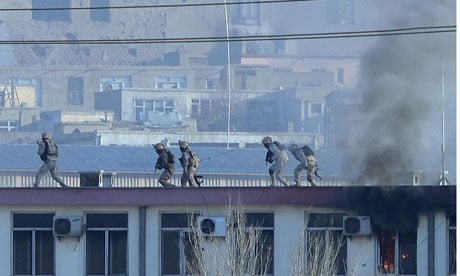Five suicide bombers stormed Kabul's lightly guarded traffic police headquarters on Monday and fought a nine-hour gun and rocket battle with security forces, killing three traffic officers. All the insurgents were killed.
It was the second serious attack in the heart of the Afghan capital in less than a week.
The Taliban claimed responsibility for both attacks, marking a bloody start to 2013 and underlining the insurgency's resources at a time when Nato troops are heading home, and the Afghan and US governments pushing hard for peace talks.
Monday's assault began in the freezing pre-dawn darkness when insurgents pulled up outside the building, detonated a bomb, shot a security guard and rushed inside, security officials said. Within minutes they had fired a rocket at another nearby police compound, although it fell short and hit a mosque, and were exchanging fire with security forces who rushed to the scene.
Around an hour later a car bomb exploded, echoing around the city and waking many in Kabul to the grim news of another suicide assault, this time near the city's zoo, parliament, several embassies, a mosque and religious university.
The assault came less than a week after attackers tried to blast their way into a heavily-guarded intelligence compound, but they were all killed within a few minutes and failed to get inside the heavily guarded headquarters. By contrast the traffic police are not always armed and if they are it is usually just a pistol, issued to help protect them from the road rage of the city's often intense and reckless drivers, rather than for doing battle with suicidal insurgents.
"Only a few guards at the compound had AK-47s," said Sayed Zahir, 52, who lives near the traffic headquarters and passes it most days. The building is usually full of people trying to get driving licences, register their cars or challenge fines, but the attack began so early that it was virtually deserted and no civilians were killed. Nine were injured, police said.
The building caught fire after several hours, creating fears that the city's register of cars and driving licences would be lost.
The battle dragged into the afternoon as two or three insurgents managed to hold off Afghan and Nato troops.
"Two were shot before they could detonate their explosives," said the city's police chief General Ayub Salangi. The car bomb was probably rigged to a timer.
During hours of fighting Afghan forces closed in on the building, scurrying across the roof as smoke billowed out, while helicopters hovered overhead and Norwegian special forces showered down rockets from a half-built house overlooking the occupied compound.
Afghan security forces also kept curious onlookers from harm with a tight cordon around the site of the attack, even in the unpaved lanes of frozen mud in the hills above the tarmacked main roads, where huddles of boys gathered to try and catch glimpses of the attack.
Outside the traffic police headquarters bullets flew over a reminder of Afghanistan's troubled search for peace – a monument to a general who fought rebels in eastern provinces (now a stronghold for Taliban-linked groups) for the government of his day nearly a century ago.
The Taliban said they were targeting a nearby compound of foreign police advisers, although that base is several kilometres away. "Our main target was the place where foreign police trainers stay," spokesman Zabihullah Mujiahid said by phone, adding that the second car bomb was intended to kill police and soldiers who first rushed to the scene. Additional reporting by Mokhtar Amiri
